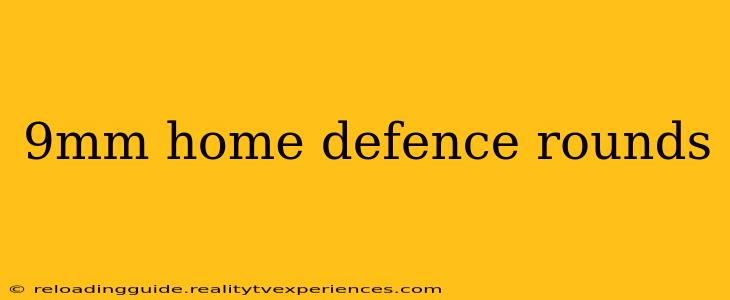Choosing the right ammunition for home defense is a critical decision, impacting the effectiveness and safety of your response in a high-stress situation. While personal preference plays a role, understanding the characteristics of different 9mm rounds is vital. This guide explores key factors to consider when selecting 9mm home defense rounds.
Understanding the Needs of Home Defense Ammunition
Home defense scenarios differ significantly from target shooting or hunting. The primary goal is to quickly and reliably stop a threat at close range, minimizing collateral damage and over-penetration. This necessitates ammunition with specific characteristics:
- Stopping Power: The ability to incapacitate an attacker immediately. This involves a combination of bullet expansion and penetration.
- Expansion: The bullet's ability to mushroom upon impact, increasing its diameter and transferring more energy to the target.
- Penetration: The bullet's ability to penetrate the target sufficiently to reach vital organs. Excessive penetration poses a risk to bystanders or structures beyond the immediate threat.
- Reliability: The round must function flawlessly in your firearm every time. This is paramount in a life-or-death situation.
- Reduced Ricochet: The likelihood of a bullet ricocheting off surfaces, potentially injuring unintended targets.
Popular 9mm Home Defense Rounds
Several 9mm rounds are commonly favored for home defense due to their proven performance. Let's analyze some of the top contenders:
1. Hollow Point Ammunition
Hollow point rounds are designed to expand upon impact, increasing their stopping power. The hollow cavity in the bullet's tip allows it to deform, creating a larger wound channel and transferring more energy. Many variations exist, each with different expansion characteristics.
- Advantages: Increased stopping power, better energy transfer.
- Disadvantages: Can be more expensive than full metal jacket rounds, potential for less penetration in certain situations.
2. Jacketed Hollow Point (JHP)
JHP rounds are a popular choice, offering a balance between expansion and penetration. The jacket helps maintain bullet stability during flight and reduces the risk of lead fouling. They are often a reliable performer in various conditions.
- Advantages: Reliable expansion, good penetration.
- Disadvantages: Cost, still some risk of over-penetration depending on the specific round.
3. +P and +P+ Ammunition
"+P" and "+P+" designations indicate rounds loaded to higher pressures than standard 9mm ammunition. These generate greater velocity and energy, potentially improving stopping power. However, it is crucial to verify that your firearm is rated for +P and/or +P+ ammunition before using it. Using higher-pressure ammunition in a firearm not designed for it can cause damage to the weapon and even injury to the shooter.
- Advantages: Increased velocity and energy.
- Disadvantages: Increased recoil, potential for firearm damage if not compatible, increased risk of over-penetration.
Factors to Consider Beyond Bullet Type
Choosing the best 9mm home defense round extends beyond bullet type. Consider these factors:
- Your Firearm: Test your firearm with different types of ammunition to determine what it cycles reliably with. Not all guns are created equal.
- Your Skill Level: Accurate shot placement is crucial. Practice is essential to develop the skills to hit your target effectively.
- Your Home's Structure: Understanding your home's construction materials (drywall, wood, brick, etc.) is important for evaluating the risk of over-penetration.
- Legal Considerations: Check your local and state laws concerning ammunition use and restrictions.
Conclusion: Responsible Ownership
Selecting the right 9mm home defense ammunition involves careful consideration of various factors. Prioritize reliability, stopping power, and penetration control while respecting your firearm's limitations and adhering to safety protocols. Regular practice, understanding your environment, and responsible gun ownership are paramount for effective self-defense. Always consult with qualified firearms instructors and legal professionals for guidance specific to your location and needs.

